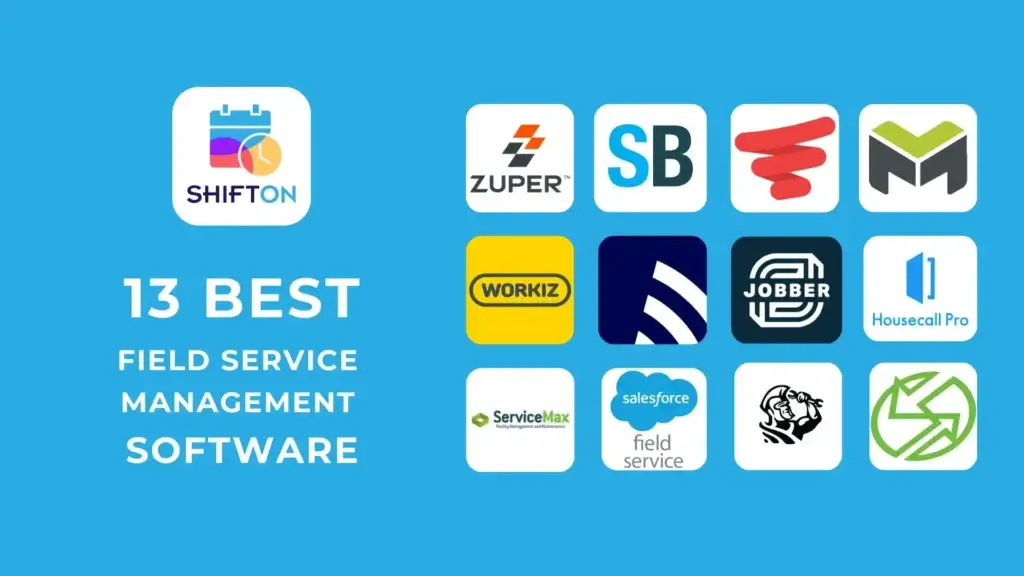In today's customer-focused business, the best field service management software plays a crucial role in ensuring a high level of customer satisfaction and optimising work processes. Every year, the number of companies offering on-site services is increasing, which makes managing these processes particularly pertinent. In this article, we'll examine the 13 best software solutions for field service management, which will help enhance your business efficiency and maximise the ease of customer interaction.
Our Top Picks For The Best Field Service Management Software
- Shifton ServiceA flexible rostering software for remote businesses.
- ServiceTitanRobust for larger teams, offering complete management solutions.
- JobberSimpler, ideal for smaller teams with streamlined scheduling and invoicing.
What is Field Service Software?
Field service management software consists of specialised systems and tools designed to optimise and automate field-related processes. These solutions are applicable in a variety of industries, including agriculture, construction, customer service, and even emergency services.One of the main responsibilities of leading field service management software is to coordinate activities related to deploying field technicians. This can include route planning, assigning tasks to employees, and monitoring their progress in real time.
The functionality of such programs often encompasses several key aspects:
- Scheduling and Dispatching: Users can create and edit schedules for field trips based on job specifics and resource availability. This helps prevent downtime and improve operational efficiency.
- Real-time Monitoring: Modern systems allow you to track the location of employees and the progress of tasks. This can be useful for both management and worker safety.
- Inventory and Resource Management: Software can keep track of required materials and equipment availability, minimising interruptions due to resource shortages.
- Reporting and Analysis: Systems gather data on tasks performed, time spent, and resources used. Analysing this information helps to improve management and identify process bottlenecks.
- Integration with Other Systems: Many solutions can integrate with CRM, ERP, and other corporate systems, enabling all parts of the company to work more cohesively.
FSM software is a powerful tool that assists organisations in not only effectively planning and coordinating field trips but also enhancing the overall quality of the customer experience. In a highly competitive market, the availability of such technologies becomes a crucial factor in business success and sustainable development.
What Are The Benefits Of Field Service Management Software?
When choosing the best field service management software, you should focus on a few key benefits to maximise its capabilities:
- Increased EfficiencyAutomating routine tasks such as scheduling appointments, assigning tasks to employees, and tracking fulfilment increases efficiency. Intuitive interfaces and algorithms reduce the time spent on administrative tasks, allowing employees to concentrate on the more critical aspects of their work.
- Enhanced ProductivityImplementing field service management software leads to increased productivity. Management systems enable better organisation of workflows, significantly reducing the time it takes to complete tasks. For instance, such solutions can optimise routes for field service workers, minimising travel time, thus saving time and allowing more tasks to be completed in less time.
- Improved Customer SatisfactionBy refining service delivery processes and enhancing communication with customers, companies can respond quicker and more efficiently. Systems can offer customers the ability to track the status of a request or order fulfilment, thereby creating transparency and increasing trust in the company.
- Optimised Resource AllocationThis approach prevents the overuse or underuse of equipment and human resources. Platforms can automatically suggest the best options for task allocation based on available resources and employee location, contributing to a more efficient use of funds.
- Better Communication and CollaborationModern field service management software systems include tools for instant messaging, project collaboration, and real-time updates. This creates a unified platform for communication and collaboration, reducing errors and enhancing overall service quality.
- Enhanced Reporting and AnalyticsLeading field service management software provides powerful reporting and analytics tools. These features allow professionals to collect and analyse data on performance, costs, and other critical business aspects. Deep analytics help identify bottlenecks in processes, make informed decisions, and find ways to improve.
Who Needs Field Service Management Tools?
Today, the best field service management software tools are becoming crucial for numerous industries that require employees to be dispatched to job sites. This can include maintenance, equipment installation, repairs, and a range of other services. Here are some of the main users:
- Equipment Maintenance Companies
- Mechanical and electrical services: These are needed to schedule maintenance and repairs at customer sites.
- IT service technicians: They use field service management software for system troubleshooting.
- Delivery and Logistics Services
- Courier services: Optimise delivery routes and times.
- Transportation companies: Oversee cargo movement and vehicle conditions.
- Real Estate Service Companies
- Property management companies: Supervise maintenance personnel work, including utilities and cleaning.
- Security services: Manage security call-outs and respond to incidents.
- Agricultural Enterprises
- Farms: Oversee technician deployments for equipment repair and maintenance.
- Agronomists and field technicians: Observe tasks in the fields.
- Systems Integrators and Technology Companies
- Video and audio installers: Schedule jobs and manage resources for equipment installation.
- IoT-enabled services: Manage data and monitor equipment performance in the field.
Key Functions of Field Service Management Tools:
- Scheduling and Dispatching
- Automatically create work schedules based on employee availability and job prioritisation.
- Notifications to customers about assigned services and job times.
- Tools to handle urgent calls and changes to scheduled tasks.
- Route Optimisation
- Algorithms to calculate the most efficient routes for field staff.
- Consider traffic, congestion, and other factors to minimise travel time.
- GPS integration for real-time navigation.
- Inventory Management
- Regulate the availability of required materials and equipment to provide services.
- Automated tracking of deliveries and stock status in warehouses.
- Demand management and procurement planning.
- Communication and Feedback
- Tools for rapid interaction between field staff and the head office.
- Systems to receive feedback from customers upon work completion.
- Real-time chat and messaging capabilities.
- Reporting and Analytics
- Generate reports on completed jobs and assess employee performance.
- Analyse customer data and identify trends in customer relationships.
- Monitor the fulfilment of KPIs (key performance indicators).
- Mobile Solutions
- Mobile applications for anytime, anywhere access to information and tasks.
- Capability to document work performance and receive reports on a mobile device.
- Sync with cloud systems for data storage.
- Integrations with Other Systems
- Capabilities to integrate with CRM systems to manage customers and their requests.
- Synchronisation with ERP systems for tracking finances and resources.
- Integration with customer support systems for handling inquiries and complaints.
Top Best 13 Field Service Management Software Tools
These tools assist in planning, monitoring, and managing tasks associated with outreach, enhancing efficiency and customer satisfaction. Here is a list of top software tools:
- Shifton
- Strives to find a program that not only efficiently addresses current problems but also has the capacity to adapt to evolving business requirements.
- Key criteria for success include user interface, integration, mobility, analytics, and process automation.
- ServiceTitan
- Designed for home service companies such as plumbers, electricians, and HVAC.
- Features include rostering, worker management, invoicing, and job tracking.
- Integrates with systems like QuickBooks and Google Calendar.
- FieldPulse
- Cloud-based management solution for small businesses.
- Offers tools for job scheduling, project management, invoicing, and client communication.
- Integrates with QuickBooks and Stripe.
- Workiz
- Designed for companies like cleaning and plumbing services.
- Features job scheduling, invoicing, customer management, and workflow automation.
- Integrates with online booking platforms and Zapier.
- Housecall Pro
- Comprehensive solution suitable for various industries.
- Offers scheduler, CRM features, billing, and online booking tools.
- Integrates with QuickBooks, Mailchimp, and other services.
- Jobber
- Cloud-based solution for SMBs to track jobs, invoice, and communicate with clients.
- Features include schedule management, workflow automation, CRM, and online payment.
- Integrates with QuickBooks, Xero, and Stripe.
- ServiceMax
- Geared toward large enterprises.
- Offers job tracking, inventory management, performance analysis, and reporting.
- Integrates with ERP systems and Salesforce.
- Service Fusion
- Comprehensive FSM service with rostering, customer management, and billing.
- Integrates with GPS for vehicle tracking and QuickBooks for accounting.
- RazorSync
- Cloud-based software with invoicing, schedule management, and client communication.
- Offers a mobile app for field access and integrates with QuickBooks.
- ServiceBridge
- Suitable for businesses like cleaning and construction.
- Provides routing, time management, billing, and CRM features.
- Offers marketing automation and CRM integration.
- Zuper
- SaaS platform with scheduling, task management, and results tracking.
- Offers a mobile app and integrates with QuickBooks.
- mHelpDesk
- Cloud-based solution for project management, invoicing, and client management.
- Features document automation and QuickBooks integration.
- Salesforce Field Service
- Extension for the Salesforce platform for large organisations.
- Offers process automation, stock management, and customer interaction.
- Supports integration with multiple third-party applications.
How To Choose the Best Field Service Software
Choosing the right field service management software can significantly impact business efficiency. Consider the following aspects:
- Essential Features: Look for rostering, billing, CRM, and mobile app capabilities.
- Types of Software: Decide between total management solutions, specialised tools, or integrated systems.
- Ease of Use: Ensure the platform is intuitive for quick acclimatisation.
- Customer Support: Choose a provider with reliable support and available resources.
- Integrations: Ensure compatibility with other systems you use.
By considering these factors, you can select a solution that optimises your processes and meets your specific needs.
Daria Olieshko
A personal blog created for those who are looking for proven practices.

 English (US)
English (US)  English (GB)
English (GB)  English (CA)
English (CA)  English (AU)
English (AU)  English (NZ)
English (NZ)  English (ZA)
English (ZA)  Español (ES)
Español (ES)  Español (MX)
Español (MX)  Español (AR)
Español (AR)  Português (BR)
Português (BR)  Português (PT)
Português (PT)  Deutsch (DE)
Deutsch (DE)  Deutsch (AT)
Deutsch (AT)  Français (FR)
Français (FR)  Français (BE)
Français (BE)  Français (CA)
Français (CA)  Italiano
Italiano  日本語
日本語  中文
中文  हिन्दी
हिन्दी  עברית
עברית  العربية
العربية  한국어
한국어  Nederlands
Nederlands  Polski
Polski  Türkçe
Türkçe  Українська
Українська  Русский
Русский  Magyar
Magyar  Română
Română  Čeština
Čeština  Български
Български  Ελληνικά
Ελληνικά  Svenska
Svenska  Dansk
Dansk  Norsk
Norsk  Suomi
Suomi  Bahasa
Bahasa  Tiếng Việt
Tiếng Việt  Tagalog
Tagalog  ไทย
ไทย  Latviešu
Latviešu  Lietuvių
Lietuvių  Eesti
Eesti  Slovenčina
Slovenčina  Slovenščina
Slovenščina  Hrvatski
Hrvatski  Македонски
Македонски  Қазақ
Қазақ  Azərbaycan
Azərbaycan  বাংলা
বাংলা 

